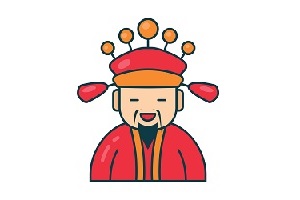When we talk about gods in feng shui, we are not necessarily referring to aspects of religion. In fact, most of the time, it is with reference to energy forces or just names of feng shui variables.
A lot of people mistake feng shui as a religion for this reason… as they keep seeing the word god in books about feng shui.
But because feng shui was practiced centuries ago in China with a huge following of Buddhism and Taoism, the “god” moniker was used to label a number of variables used in the study of Chinese metaphysics.
Thus, we are using the same terms to describe bodies of Chi in feng shui today.
For example the Cai Shen (财神) is a reference to a particular energy force that can bring wealth luck for homeowners who are able to tap onto it. Religious and superstitious practitioners then decided to put a face to Cai Shen by embodying it to a god of wealth. Then Chinese culture led it to be embodied in historical characters like Bi Gan and Guan Yu.

So when we mention the god of wealth, the images of a middle aged man wearing oriental costume and holding gold ingots come to mind.
Religious people are referring to Cai Shen in feng shui and bazi. Just that they have godly characters that represent these energy forces.
This is in huge part, an effort to simply them when used in speech.
For example, we just call the height a commercial jetliner is at when cruising as cruising altitude instead of calling it “between 32,000 and 42,000 feet”. Or when we call Pi as Pi instead of “3.14159265359”.
There are various uses of the word “god” in feng shui variables. Some of which include:
- 10 gods
- Door god
- Kitchen god
- etc
Flying star feng shui for example, make a lot of references to the 9 stars. The mention of these stars are also representations to energy forces that feng shui practitioners are trying to tap.
The same can be said of symbols used in the practice of feng shui.
The pine tree for example is symbolic of longevity. This is a reference to a particular energy force. An energy force that the symbolism of the pine tree is able to call upon.
Remember that feng shui concerns the management of environmental and cosmic energy forces.
Whether we are using gods or symbols to label particular energies do not defeat the purpose of feng shui.
It is also important to realize that the approach to feng shui of non-religious and religious people can be very different.
One side of the coin is a group who practices feng shui more as a science than anything else. The other practices feng shui in tandem with religion.
While the former tends to write-off symbolism and worship, the latter tend to embrace the whole of feng shui and it’s connotations as one.
Yet make no mistakes about it.
There is a line the separates feng shui and religion. But while this line is very obvious for practitioners of metaphysics, it might not be so easy for hobbyists to differentiate.















